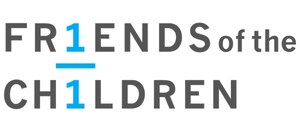PORTLAND, Ore., Jan. 8, 2019 /PRNewswire/ -- One of the most traumatic experiences a family can go through is a child being separated from her or his parents. Entering the foster care system becomes yet another traumatic event in the life of a child, but a new study funded by the Annie E. Casey Foundation shows that Friends of the Children's long-term mentoring model is a promising solution for families impacted by foster care. The national nonprofit, which has 15 locations around the country and in the U.K., selects children ages 4-6 from foster care and high-poverty schools and pairs them with a salaried, professional mentor (called a Friend) from kindergarten through graduation—12 ½ years, no matter what.
"The Friend relationship provides an avenue for promoting family stability, permanence and child well-being by providing holistic support to child welfare system-involved caregivers, families and children," said lead author Amy M. Salazar, M.S.W., Ph.D., Assistant Professor at Washington State University Department of Human Development. The study was conducted at the University of Washington School of Social Work Social Development Research Group and Washington State University Vancouver, and was published in the Child & Family Social Work journal.
With more than 437,000 children in foster care nationwide, a number that has seen a 10 percent increase since 2012, organizations like Friends of the Children, which is funded primarily through private philanthropy, are coming to the table with innovative solutions.
"The Friends of the Children model is clearly aligned with [Annie E.] Casey's priority of making sure that all kids have the opportunity to thrive, but the appeal of this study in particular was its interest in improving services to the whole family — which we know produces better results than a single-generation approach," says Suzanne Barnard, director of Casey's Evidence-Based Practice Group.
Four global themes emerged from the research, providing more insights into why the model works:
- Advocating and connecting: Friends advocate for families by empowering them with tools to navigate complex systems, connect with needed services and supports, and build connections among providers and stakeholders in families' lives. They also connect participants to various resources such as counseling, youth programs, transportation assistance and basic needs such as food and clothing.
- Knowledge and skill building: Friends empower children and caregivers to strengthen social-emotional skills that promote positive behavior and family stability. They also coach children and caregivers about their rights within systems of influence, such as schools and child welfare.
- Relational support: Friends are role models, providing consistency and continuity. When children are transitioning homes and caregivers with frequency, Friends are a valuable resource to help caregivers understand a child's strengths, needs and interests. Friends are good listeners and help caregivers feel supported in promoting their child's well-being.
- General support: Friends provide emotional and logistical support through crises and challenges, education-related support, opportunities that build social capital, and parenting assistance such as collaborating on goals and supporting behavioral challenges.
One Friend expressed their role as "just being their supporter, so they feel like they have a friend in the room when they're trying to problem-solve." A caregiver shared, "They've helped me with summer programs for my kids and resources for me…It's a whole array of things. They're not just there to help kids. They're there to help the family unit."
The research included data analysis and interviews with caregivers (biological and foster parents), teachers, case workers and professional mentors from the Portland, Ore., Seattle, Wash. and Tampa Bay, Fla. chapters of Friends of the Children.
Since beginning to select children directly from foster care systems across the country, child welfare agencies including Los Angeles County, which has the highest number of children in foster care, are looking to the model as a promising solution. The nonprofit is piloting a new "Two-Generation" approach in Los Angeles and New York City where they are selecting the children of parents who have been impacted by foster care.
"We want every child in foster care to have a Friend," says Terri Sorensen, CEO of Friends of the Children. "We hope this research will open more doors to partnering with child welfare agencies across the country. Our new approach of selecting youth directly from foster care is going to be key to expanding to 25 cities by 2025, which is our goal."
Access the full press release, report and media kit here.
About Friends of the Children
Friends of the Children is a national nonprofit based in Portland, OR with the mission of breaking the cycle of generational poverty by giving the most vulnerable children the ability to create a new story. We select the most vulnerable children ages 4-6 from high-poverty schools and the foster care system and pair them with a salaried, professional mentor (a Friend) who stays with them from kindergarten through graduation – 12 1⁄2 years, no matter what. Our Friends support and guide our children in becoming healthy and contributing members in their communities. Our successful model is now in 15 locations, including four sites in Oregon (Portland, Gresham, Klamath Falls and Central Oregon); Austin, Texas; Boston, Mass., Charlotte, N.C.; Chicago, I.L.; Harlem and the South Bronx, N.Y.; Los Angeles and San Francisco, Calif.; Seattle, Wash; Tampa Bay, Fla.; and Cornwall, U.K. Find us on Facebook, Twitter, Instagram and LinkedIn, or visit friendsofthechildren.org.
CONTACT:
Ariane Le Chevallier
[email protected]
971-201-1214
SOURCE Friends of the Children
Related Links
WANT YOUR COMPANY'S NEWS FEATURED ON PRNEWSWIRE.COM?
Newsrooms &
Influencers
Digital Media
Outlets
Journalists
Opted In





Share this article